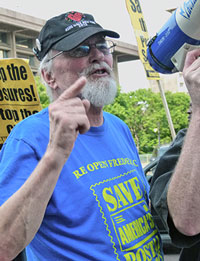Postal bigwig nearly arrested at hunger-strike rally
By
Joseph Piette
Washington, D.C.
Published Jul 5, 2012 9:04 PM
It took two dozen cops lined up in front of United States Postal Service headquarters to stop postal worker retiree John Dennie’s gallant attempt to make a citizen’s arrest of Postmaster General Patrick Donahoe. Dennie’s hands were pulled behind his back and cuffed. Cops led him away as 140 union and community supporters chanted, “Arrest Donahoe.”
|
Postal worker John Dennie,
who tried to make citizen’s
arrest of Postmaster General
Donahue.
WW photo: Betsey Piette
|
Ten minutes later, the released Dennie reported to the crowd that the postal police had said he “would not be arrested here at Postal Headquarters. If he wanted to be arrested, he should go downtown where the Metro Police would do it.” Dennie is a New York member of Community Labor United for Postal Jobs and Services.
While Donahoe — wanted for violating “delay of mail” postal regulations — avoided arrest this time, the four-days-long Hunger Strike Back to Save Our Post Office was a success. No, it didn’t arrest Donahoe, nor did it stop the privatization campaign being pushed by the 1%. But it did get out the message to the rest of the labor movement and to many other workers around the country that low-cost mail delivery — and over 500,000 jobs — are under attack.
More than a dozen postal workers and their supporters went without food from 8 a.m. on June 25 to 6 p.m. on June 28. “Not the Internet. Not private competition. Not the recession. It’s the prefunded mandate that’s starving the Postal Service,” explained hunger striker and retired letter carrier Jamie Partridge from Portland, Ore. (Insight News.com)
The Postal Accountability and Enhancement Act of 2006 (PAEA) mandates that the USPS prefund its retirement benefits 75 years into the future in a 10-year window, at a cost of $5.5 billion a year. No other corporation or government agency has such a burden. Despite huge productivity gains over the last decade, the USPS has been unable to overcome the financial hurdle.
Postmaster General Donahoe has announced that overnight, single-piece, first-class mail will be phased out beginning July 1, that half of the 475 mail-sorting plants in the country will be closed, and that service hours in 50 percent of all the post offices will be drastically reduced. He also wants to reduce mail delivery to five days a week.
“The Postmaster General is sending the service into a death spiral,” says Matt McAuliffe, a mailhandler and hunger striker from Denver. “By slowing the mail one to two days, the postal service will drive away customers. Those most dependent on the mail, the elderly, the poor and rural communities, will be hit the hardest.” (dclabor.org)
Nationwide actions
Called by Communities and Postal Workers United, letter carriers, mail handlers, mail processing workers and community supporters in cities around the country organized the Hunger Strike Back to demand that the PAEA be replaced by fair legislation that saves, not buries, the 250-year-old postal service. Hundreds of APWU, NALC and other local union officials as well as community organizations endorsed this campaign.
Protests took place in Seattle; Chicago; South Bend, Ind.; Richmond, Va.; and other cities across the country during the hunger strike. In San Francisco, 200 postal workers, union members and community activists marched into a post office, where they rallied. In Portland, Ore., a similar occupation led to 10 arrests.
On the East Coast, a caravan organized by the Community Labor United for Postal Jobs and Services began in Newburgh, N.Y., at 4 a.m. on June 28. It picked up participants in New York, Philadelphia and Baltimore before joining a rally at Postal Headquarters in Washington.
APWU Mid-Hudson president and hunger striker, Debbie Szeredy, spoke at a 6:30 a.m. rally at Manhattan’s main post office. Four hours later, she spoke alongside Philadelphia APWU president, Gwen Ivey, in front of a post office located on property once owned by the first postmaster general, Benjamin Franklin. The B. Free Franklin Post Office has been threatened with closure.
At the caravan’s next stop, Szeredy, Baltimore APWU president Thomasine Derricks and other community activists stood side by side as they criticized anti-worker and anti-community policies by postal management and Congress.
In Washington, a rally on L’Enfant Plaza led by NALC Local 3825 president, Ken Lerch, featured speeches by labor officials, community leaders and several hunger strikers, including Nannette Corley, president of the Montgomery County, Md., area APWU Local 3630 and Tom Dodge, APWU Local 781 member and a CPWU leader.
The assembly was re-energized when about 40 Occupy Washington supporters marched into the crowd, just minutes before Dennie began his attempt to arrest the top official in the postal hierarchy for crimes against the people’s post office.
Donahoe remains at large.
Articles copyright 1995-2012 Workers World.
Verbatim copying and distribution of this entire article is permitted in any medium without royalty provided this notice is preserved.
Workers World, 55 W. 17 St., NY, NY 10011
Email:
[email protected]
Subscribe
[email protected]
Support independent news
DONATE


